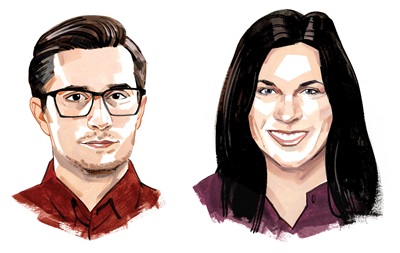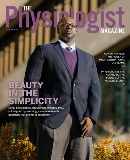Talk It Through
The importance of communication and navigating tough choices.

Each issue, we ask a trainee or early-career member to pose their career questions to an established investigator and mentor. Here, Luis Angel Rivera Arce, a fifth-year PhD candidate at Ponce Health Sciences University in Puerto Rico, asks Jennifer C. Sullivan, PhD, dean of the graduate school and professor of physiology at Medical College of Georgia at Augusta University, for advice on navigating life-changing decisions.
Q: What are the most important core skills for graduate students
to acquire by the end of their PhD and why?
A: The core skills that will serve all students best are not going to be technical; they are going to be the skills that they use in all facets of their lives: the ability to articulate their
thoughts to a wide range of audiences, confidence in themselves as scientists and the ability to get back up and try again. Effective communication is crucial, and learning to confidently communicate with leaders in the field, peers and laypersons will
expand your network and ensure you always make a positive impression. In addition, no matter what career path you choose or how your personal life unfolds, there will be bad days. You need the resiliency to get up, keep moving forward and work to find
a solution.
Q: Sometimes the graduate student’s goals don’t align with the adviser’s goals for the student; what advice would you give for this type of graduate student?
A: The most important decision you will make
in graduate school is who will serve as your major adviser. I work with students often in our program, and I always tell them that the “fit” between mentor and mentee is much more important than the project or the techniques employed. Use
rotations to determine if the mentoring styles and goals align. If you note early on that the goals do not align, find another adviser. If the student is farther along in the program, communicate your needs and goals clearly and respectfully to your adviser.
Articulate what your goals are and why. If the student still does not feel heard, include the committee or another advocate to help navigate any misalignment.
Q: Sometimes circumstances make you change direction or even a career path;
what recommendations would you give graduate students, or even postdocs, navigating life-changing circumstances?
A: Know yourself: What are your values? What are your passions? What makes you happy? Spend time assessing your needs for a fulfilled
life. I do not say this lightly, but the opportunities for a do-over are few. As you consider a change, take time to think through the implications both personally and professionally. Talk to the people you trust—your family, partner, friends, colleagues
and mentors. Life is too short to not enjoy what you are doing, and regret will serve no one. If a challenge comes up, look for opportunities that get you excited and fully embrace any change.
Q: What are the current challenges
in academia, and how do you think the new generation of physiologists can make a change?
A: Funding is always a challenge, and the uncertainty that comes with the quest for the next grant can be highly stressful. I think collaboration is often
a help, and I imagine the next generation will continue to be more open to team science and working together for the greater good. Having an engaged group of collaborators not only helps in funding, but in providing a strong network and support system
to keep the whole team more positive and productive.
Got a career question you'd like to submit? Email it to tphysmag@physiology.org. We may use it in an upcoming Mentoring Q&A.
The Physiologist Magazine
Read the Latest Issue
Don’t miss out on the latest topics in science and research.
View the Issue Archive
Catch up on all the issues of The Physiologist Magazine.
Contact Us
For questions, comments or to share your story ideas, email us or call 301.634.7314.


